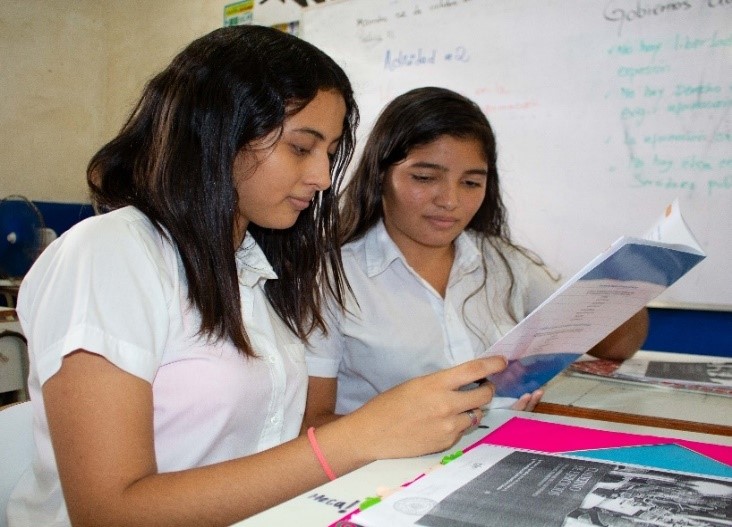Educational institutions and guarantors of access to public information promote a culture of transparency in El Salvador with the support of EUROsociAL+, by Borja Díaz Rivillas, senior technician, EUROsociAL+ Democratic Governance Area at FIIAPP

Salvadoran students work with one of the guides on access to public information
It is early in the morning and Nancy Hernández, an information officer in the mayor’s office in the Salvadoran municipality of Puerto de la Libertad, has 15 impeccably uniformed high school students in front of her. Contrary to what might be assumed with regard to some young people of their age, they have a detailed knowledge on the Law on Access to Public Information (LAIP), which the vast majority of their fellow citizens are unaware exists. Not only that, but they have also appeared at the Mayor’s Office to put this citizen’s right into practice, and they have asked Nancy for different details regarding municipal management.
The students come from the Instituto Nacional del Puerto de la Libertad, one of the 11 schools in El Salvador that are participating in an educational pilot project in the area of transparency and access to public information promoted by the Ministry of Education (MINED) and the Institute of Access to Public Information (IAIP), with the support of the European Union cooperation programme EUROsociAL+.
Within the framework of this initiative, methodological guides have been designed for teaching the culture of transparency at all levels of the social science education system (kindergarten, first, second, third cycle and high school). The publications are intended for students, but also for their parents, or family managers.
With their presence in the Puerto de la Libertad municipal offices, before the person in charge of receiving, processing and resolving requests for information, these 15 young people are exercising one of the activities listed in the guides, which they have previously dealt with in class with their teacher, Juan Carlos Ibarra.
Juan Carlos explains to us the importance of including the right of access to public information in the syllabus: “Together with these young people, we are building what it means to be a citizen, we are exploring our society’s values and the functioning of democracy. As citizens we have duties such as paying taxes, but we also have the right to request and receive public information about how public resources are used and how decisions are made, because that information belongs to all of us”.
The validation process for the pilot project’s teaching materials has been successfully completed and it will now be extended to the entire country. Gustavo Antonio Cerros, Head of the Middle Education Curriculum Department at MINED, describes the process: “We have organised workshops with students, teachers, and administrators. We have also worked with some parents, we have held discussions and we have gone to schools to see how the material is used”.
This fulfils one of the objectives pursued by the LAIP in 2011, that is, “to contribute to constructing a culture of transparency and access to information, by creating tools that promote the recognition and appropriation of the right of access to public information by Salvadoran children and young people, through the inclusion and development of content in the curricula of formal education at the basic and middle levels”.
“Teaching from an early age is essential, as people are not yet familiar, it takes a lot of motivation to exercise this right”, says IAIP President Commissioner Cristina Pérez. And the fact is that requests for information have so far been very limited, being mainly in the hands of journalists and specialised NGOs. At the moment, it is not a right that citizens as a whole feel they have been empowered to exercise.
We are facing a new paradigm in the relationship between the State and citizens, as the Commissioner highlights: “In my student days, we took it for granted that the civil service was untouchable, that nothing could be done to change reality or to question it. By teaching this type of subject, students learn that they can demand accountability and contribute to the democratisation of the country”.
El Salvador thus becomes one of the first countries in Latin America to include this topic in the educational system, which involves Sustainable Development Goals (SDGs) 16 (Peace, Justice and Solid Institutions) and 4 (Quality Education), and is also in line with one of the recommendations of the Lima Commitment emanating from the last Summit of Heads of State and Government of the Americas (2018): “To develop a culture of transparency, citizen participation and corruption prevention to strengthen democratic and civic values from early childhood and throughout life, implementing teaching and learning programmes at the different levels in the educational systems, as well as in continuing education programmes”.
The fruits of this process are already being seen with the promotion of the right of access to public information in the educational community. “Many students are interested in learning about community projects on street lighting, they ask why the solid waste collection truck does not go through their community, why streets have not been paved. Many of these young people become community leaders and access to information is a tool for citizen empowerment that allows them to influence municipal public life”, concludes the teacher Ibarra.
Borja Díaz Rivillas, senior technician, Democratic Governance Area, EUROsociAL+ at FIIAPP



